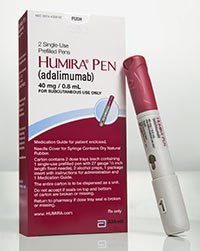
[ad_1]
The US Food and Drug Administration (FDA) approved several medications of import to nurse practitioners (NPs) and physician assistants (PAs) in February 2021, including new treatment options for pediatric patients with ulcerative colitis and neurogenic detrusor overactivity.
Humira for Pediatric Ulcerative Colitis
Humira® (adalimumab) injection was initially approved in the US in 2002 to treat rheumatoid arthritis; in 2021, the FDA expanded the drug’s indication to include treating ulcerative colitis (UC) in patients aged 5 years and older with moderate to severe UC.
The approval follows 2 randomized, double-blind clinical trials in which the medication was more effective at achieving clinical remission in pediatric and adult patients compared with placebo.1 Researchers did not assess the efficacy of Humira for patients who do not respond to tumor necrosis factor blockers.
Botox for Pediatric Neurogenic Detrusor Overactivity
Botox® (onabotulinumtoxinA) is now approved to treat patients aged 5 years and older who have urinary incontinence due to detrusor overactivity associated with a neurologic disorder.
The expanded indication for pediatric detrusor overactivity, also known as overactive bladder syndrome, is intended for patients whose disease is unresponsive to anticholinergic medication. Intradetrusor injection of Botox is contraindicated in patients with urinary retention or post-void residual urine volume of more than 200 mL who are not routinely performing clean intermittent self-catheterization and in patients with a urinary tract infection.2
References
- Humira [package insert]. AbbVie; 2021. Accessed March 1, 2021. https://www.rxabbvie.com/pdf/humira.pdf
- Botox [package insert]. Allergan, Inc.; 2021. Accessed March 1, 2021. https://media.allergan.com/actavis/actavis/media/allergan-pdf-documents/product-prescribing/20190620-BOTOX-100-and-200-Units-v3-0USPI1145-v2-0MG1145.pdf
Want to read more?
Please login or register first to view this content.
[ad_2]
Source link
